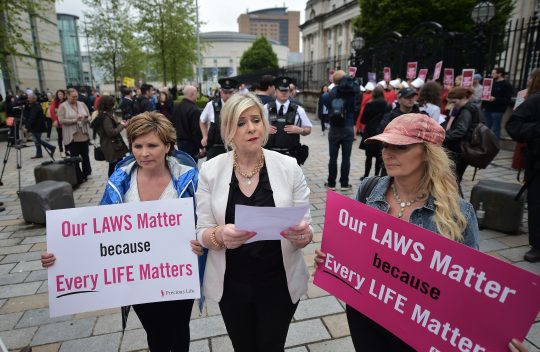On Tuesday, the British House of Commons debated whether or not to liberalize Northern Ireland’s restrictive abortion laws.
The debate comes just over a week after citizens of the Republic of Ireland approved a referendum opening the door to legalized abortion in that country, the Guardian reports. Since the Irish referendum was approved, British Prime Minister Theresa May has dealt with mounting pressure to reform Northern Ireland’s abortion statutes. The Northern Irish law pertaining to abortion is currently the strictest in the United Kingdom and permits abortion only when there is real and substantial risk of loss of the woman's life, including from a risk of suicide, that can only be averted by carrying out an abortion.
Northern Ireland Secretary of State Karen Bradley told the Commons, the U.K.'s directly-elected lower house, the issue "should be decided by the people of Northern Ireland." She added that the issue has "long been devolved" to Northern Ireland and outside the purview of the Parliament in Westminster. She also noted, however, that she personally supports reform.
The debate revealed deep divisions in the Conservative Party. Heidi Allen, a Conservative Member of Parliament (MP) spoke in favor of changing Northern Ireland’s laws, citing her own experience having an abortion. On the other hand, Maria Caulfield, a fellow Conservative MP, argued proponents of Parliament-imposed reform were sending the message "that the women in Westminster know best."
Stella Creasy, a Labour MP who had called for the debate, contended she respected the right of Northern Ireland’s assembly to address abortion. She would like parliament to repeal parts of the Offences Against the Person Act of 1861, thereby decriminalizing abortion in Northern Ireland. Nevertheless, she argued repeal would still allow Northern Irish legislators to fix limitations on abortion.
"Let me reassure those MPs who want to uphold the role of devolved assemblies," said Creasy, "that repealing OAPA would not write a particular abortion law for anyone, but it would require them to act."
The prime minister privately told Conservative MPs that she does not support action to reform Northern Ireland’s laws. May believes the matter should be left to the Northern Irish government; moreover, she cannot risk alienating MPs from the Northern Irish Democratic Unionist Party (DUP), upon whom her government relies for votes.
DUP MPs made it clear during the debate that the issue is for Northern Ireland to decide. The party’s chief whip, Jeffrey Donaldson, told Parliament he was "proud of the fact that there are so many people alive in Northern Ireland today because we have a law that respects the rights of both women and of the unborn child."
May’s government could face more pressure to act if the U.K. Supreme Court rules this week that Northern Ireland’s abortion restrictions violate human rights statutes.
